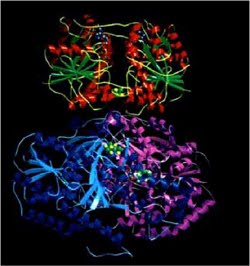Evolution: It’s all in how you splice it... MIT biologists find that alternative splicing of RNA rewires signalling in different tissues and may often contribute to species differences. Full story here.
Sunday, December 30, 2012
Friday, October 26, 2012
EVOLUTION INTELLIGENT NOT RANDOM
Far from Random, Evolution Follows a Predictable Genetic Pattern
That headline in ScienceDaily says it all, and gives very nice empirical evidence to back up what this blog has been saying for years--i.e., that 'evolution' is driven by intelligent processing down through the generations.
It is not random changes. Nor is it random changes selected by the chances of reproduction and circumstance. Or any such nonsense.
So, once again: DNA is an intelligent processing system that works within organisms and across time to maintain and enhance life. That is sense.
Evolution is not blind. It knows what it is doing. Darwin was wrong.
Thursday, September 6, 2012
HOW THE INTELLIGENT GENOME WORKS
The Human Genome Project produced an almost complete order of the 3 billion pairs of chemical letters in the DNA that embodies the human genetic code -- but little about the way that blueprint works. Now, after years of concerted effort by more than 440 researchers in 32 labs around the world, in a project called ENCODE, a more dynamic picture gives the first holistic view of how the human genome does its job.
'During the early debates about the Human Genome Project, researchers had predicted that only a few percent of the human genome sequence encoded proteins, the workhorses of the cell, and that the rest was junk. We now know that this conclusion was wrong,' said Eric D. Green, M.D., Ph.D., director of the National Human Genome Research Institute (NHGRI), a part of the National Institutes of Health. 'ENCODE has revealed that most of the human genome is involved in the complex molecular choreography required for converting genetic information into living cells and organisms.'
'We've come a long way,' said Ewan Birney, Ph.D., of the European Bioinformatics Institute, in the United Kingdom, and lead analysis-coordinator for ENCODE. 'By carefully piecing together a simply staggering variety of data, we've shown that the human genome is simply alive with switches, turning our genes on and off and controlling when and where proteins are produced.'
Which is precisely what this blog has been saying for years.
Full story on ScienceDaily.
Thursday, August 23, 2012
SMARTER MOLECULES IN HUMAN BRAINS
A UCLA study reported in ScienceDaily has overturned the traditional view of the evolution of the human brain.
'Scientists usually describe evolution in terms of the human brain growing bigger and adding new regions,' explained the principal investigator, Dr. Daniel Geschwind, the Gordon and Virginia MacDonald Distinguished Professor of Human Genetics and a professor of neurology at the David Geffen School of Medicine at UCLA. 'Our research suggests that it's not only size, but the rising complexity within brain centers, that led humans to evolve into their own species.'
Using post-mortem brain tissue, Geschwind and his colleagues applied next-generation sequencing and other modern methods to study gene activity in humans, chimpanzees and rhesus macaques, a common ancestor for both chimpanzee and humans that allowed the researchers to see where changes emerged between humans and chimpanzees. They zeroed in on three brain regions -- the frontal cortex, hippocampus and striatum.
By tracking gene expression, the process by which genes manufacture the amino acids that make up cellular proteins, the scientists were able to search the genomes for regions where the DNA diverged between the species. What they saw surprised them.
'When we looked at gene expression in the frontal lobe, we saw a striking increase in molecular complexity in the human brain,' said Geschwind, who is also a professor of psychiatry at the Semel Institute for Neuroscience and Behavior at UCLA.
'Although all three species share a frontal cortex, our analysis shows that how the human brain regulates molecules and switches genes on and off unfolds in a richer, more elaborate fashion,' explained first author Genevieve Konopka, a former postdoctoral researcher in Geschwind's lab who is now the Jon Heighten Scholar in Autism Research at University of Texas Southwestern Medical Centre.
'Scientists usually describe evolution in terms of the human brain growing bigger and adding new regions,' explained the principal investigator, Dr. Daniel Geschwind, the Gordon and Virginia MacDonald Distinguished Professor of Human Genetics and a professor of neurology at the David Geffen School of Medicine at UCLA. 'Our research suggests that it's not only size, but the rising complexity within brain centers, that led humans to evolve into their own species.'
Using post-mortem brain tissue, Geschwind and his colleagues applied next-generation sequencing and other modern methods to study gene activity in humans, chimpanzees and rhesus macaques, a common ancestor for both chimpanzee and humans that allowed the researchers to see where changes emerged between humans and chimpanzees. They zeroed in on three brain regions -- the frontal cortex, hippocampus and striatum.
By tracking gene expression, the process by which genes manufacture the amino acids that make up cellular proteins, the scientists were able to search the genomes for regions where the DNA diverged between the species. What they saw surprised them.
'When we looked at gene expression in the frontal lobe, we saw a striking increase in molecular complexity in the human brain,' said Geschwind, who is also a professor of psychiatry at the Semel Institute for Neuroscience and Behavior at UCLA.
'Although all three species share a frontal cortex, our analysis shows that how the human brain regulates molecules and switches genes on and off unfolds in a richer, more elaborate fashion,' explained first author Genevieve Konopka, a former postdoctoral researcher in Geschwind's lab who is now the Jon Heighten Scholar in Autism Research at University of Texas Southwestern Medical Centre.
Subscribe to:
Posts (Atom)


